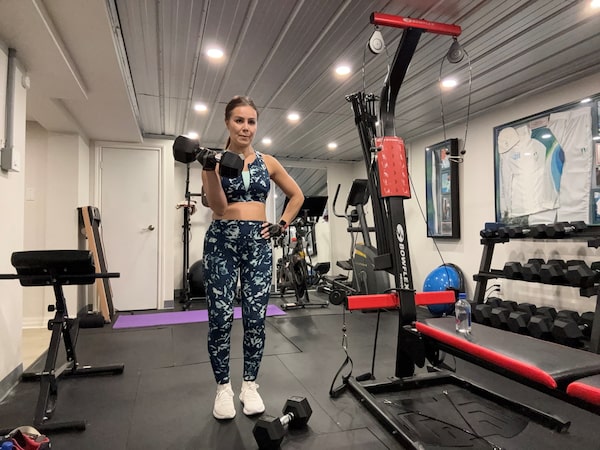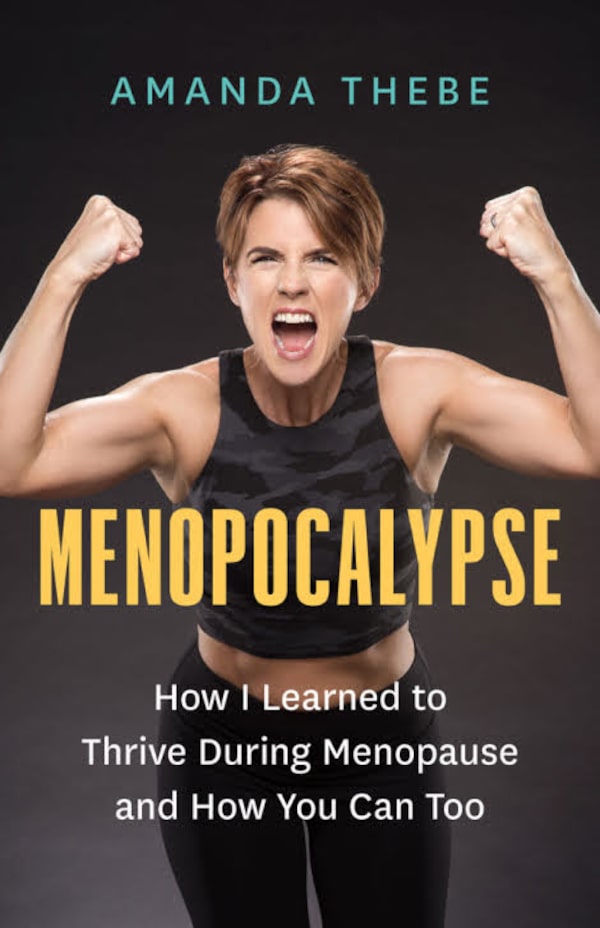
Melissa Grelo has been on a heavy lifting journey, and now she’s clutching inarguable proof that her hard work in the gym has paid off.Supplied
Melissa Grelo is waving a piece of paper at her phone’s camera, a smile broadening across her face. Since beginning perimenopause, the 46-year-old has been on a heavy lifting journey, and now she’s clutching inarguable proof that her hard work in the gym has paid off, not in loss but in gains. She has put on two pounds of skeletal muscle mass and is “ecstatic.”
“So what that my weight hasn’t changed?” the host of CTV’s The Social and the new podcast Aging Powerfully said on Instagram. “My body composition has changed … That’s the only direction I need this to go.”
This is what many perimenopausal and menopausal women are learning: The most impactful exercise for this phase of life is resistance training. It helps combat decline in bone density, muscle mass and strength, and can have a meaningful effect on body composition changes. When combined with proper nutrition, mobility work and adequate recovery, it can make an often difficult period more manageable.
For Grelo, it’s allowed her to claim some control over the physical changes that accompany this stage of life.
“This is new territory for me, to be honest,” she said in an interview. “I like it. It’s intimidating, but I know I’m seeing gains fast.”
Everyone should be lifting weights. Here’s why
Most women will be in perimenopause (the transition into menopause when they begin experiencing menopausal symptoms) for seven to 10 years and will enter menopause after their final menstrual period. When they have not had a menstrual period for a full year, women are considered postmenopausal. Around 75 per cent of women experience some menopausal symptoms.
Yes, your body will change, but strength training can alleviate some symptoms
To be clear, nothing you do will halt the progression of menopause. “Our physiology is changing and we need to change with it,” says Carla DiGirolamo, a board certified reproductive endocrinologist and Menopause Society certified menopause practitioner. But, she added, “this stage of life isn’t a decline, it’s a detour.”
During the menopausal transition, the percentage of body fat often increases, though a person may maintain the same amount of body fat, explains Christine Yu, journalist and author of Up to Speed: The Groundbreaking Science of Women Athletes. “That’s because percentage body fat describes the relationship between fat and muscle in the body. As muscle naturally declines with age and decreasing hormones, per cent body fat will shift higher in relationship to muscle, even if total body fat remains the same.”

The cover of Up to Speed.Supplied

Author of Up to Speed, Christine Yu.SYLVIE ROSOKOFF/Supplied
Fat distribution in the body changes as well, with more fat stored in the abdomen after estrogen declines.
According to a new study of 72 women in various stages of pre-, peri- and postmenopause, percentage of body fat was a significant predictor for amount and intensity of menopause symptoms. Because vigorous or high-intensity exercise, such as strength training, leads to increases in muscle mass, it can offset some of this shift and the associated symptoms.
Muscle loss also leads to a change in how our body manages glucose. “We forget that muscles have a tremendous role in glucose metabolism because, after the brain, skeletal muscle uses the most sugar that our body takes in,” says DiGirolamo. “And so when our muscles aren’t functioning as efficiently as they once did, our glucose management isn’t happening as efficiently. And when glucose isn’t being metabolized, more goes to fat storage.”
A beginner’s guide to strength training, even if you’re intimidated by the gym
Prioritize strength training but listen to your body
Amanda Thebe, author of Menopocalypse: How I Learned to Thrive During Menopause and How You Can Too and a co-founder of Nyah Health, a virtual health platform for menopausal women, was a physically active personal trainer when her transition into early perimenopause forced her to reconsider how hard and how often she pushed her body.

The cover of Menopocalypse.Supplied

Author of Menopocalypse, Amanda Thebe.Supplied
Chronic fatigue, bouts of vertigo and brutal headaches were her norm for eight years. Long, steady-state workouts like running were difficult for her body to recover from, whereas resistance training was more easily modified to meet her body’s level of available energy.
Now a public speaker on the topic of menopause, Thebe often shares the “sliding scale” strategy she used to determine which type of activity her menopausal body could manage on a given day, with level one being easy (say, going for a walk) and level 10 being an expletive-inducing workout.
“Women often don’t believe they have the power to make a choice when it comes to how they exercise,” says Thebe. “Understand that your energy levels may differ from day to day and that’s completely normal.”
Don’t skip rest days and mobility
For women in the menopause transition, getting adequate recovery is crucial.
“Chronic fatigue is one of the symptoms of menopause,” says Thebe. Lack of sleep, often owing to hot flashes or anxiety, can contribute to this, and working out while fatigued can lead to inflammation, diminished performance and even injury.
Why you need a break from working out
DiGirolamo emphasizes the importance of including mobility work in our workout routines. During the menopause transition, she explains, the character of the tendons and ligaments changes, becoming stiffer and less pliable.
“We have to focus on maintaining range of motion,” she says. “If you stop using the joint, it’s going to stiffen up and your range of motion is going to decrease.”
However you approach strength training in menopause, stick with it
“Even if it doesn’t feel like resistance training is helping in the moment, even if they’re only showing up and doing 10 minutes here and there, I want women to trust the process and know that it will pay off,” says Thebe.
For Grelo, the payoff is twofold: She’s seeing and feeling the results of her hard work in the gym, and she’s using her experience and knowledge to spread the word to others through her platform and podcast.
“When I take up space now, it’s by leading with my age, it’s by leading with my experience,” she says. “I want to be as strong on the outside as I feel on the inside. I want my body to say ‘You cannot ignore me and say I’m no longer relevant.’ Says who? I decide. Maybe I haven’t even peaked yet. The best is yet to come.”
Alyssa Ages is a journalist and the author of Secrets of Giants: A Journey to Uncover the True Meaning of Strength, published by Avery/Penguin Random House in September, 2023. She is also a strongman competitor and endurance athlete, as well as a former personal trainer and group fitness instructor.